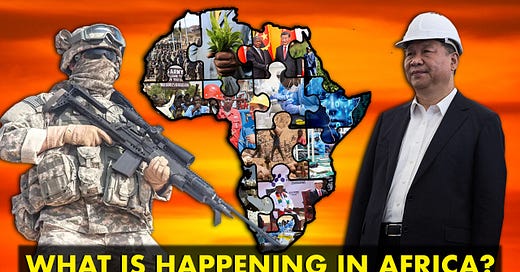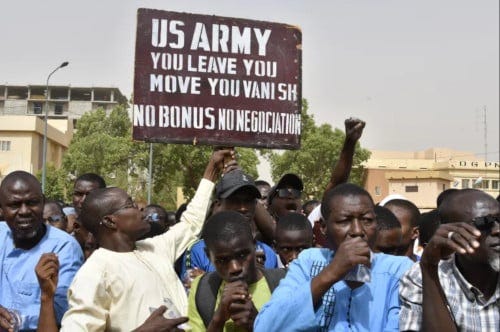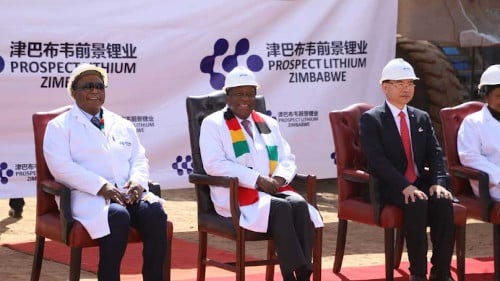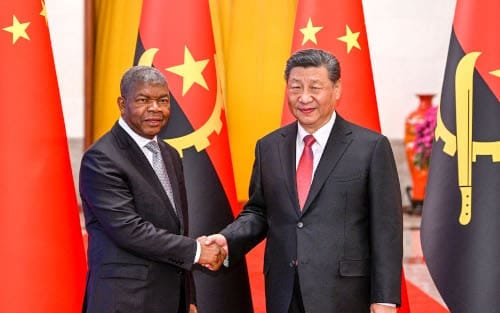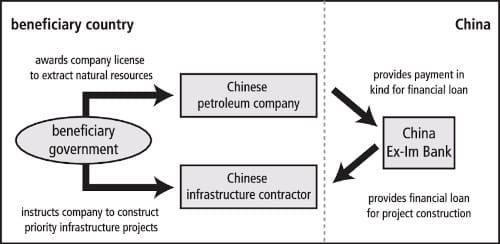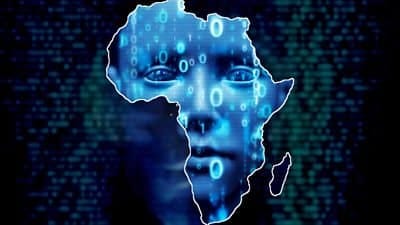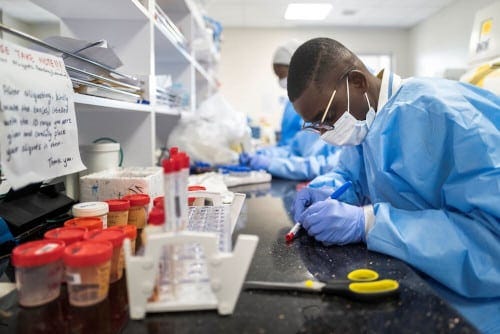by James Corbett
corbettreport.com
May 12, 2024
Six years ago, I wrote "The Secret Battle for Africa." In that editorial, I noted the extent of US Special Forces penetration into Africa and examined the geopolitical reality underlying this covert invasion:
Even a cursory review of the evidence shows that one important reason the US is deploying so many commandos to Africa in the first place is precisely to counter Chinese interests on the continent.
And, as I pointed out at the time, China was playing its own part in this neo-colonial struggle for influence in Africa. Rather than seeking a military footprint on the continent, however, China has been engaged in "checkbook diplomacy," reinvesting its capital from the economic boom of recent decades in infrastructure projects and other Belt and Road initiatives in Africa.
Well, here we are six years later. How has this new scramble for influence on the African continent played out so far? And where will it go from here?
Today, let's examine some of the key battlegrounds in the Secret Battle for Africa.
NIGER
If you did read my article on "The Secret Battle for Africa" six years ago (or if you just re-read it now), you'll recall that the launching point for that investigation was an October 2017 article revealing that three US Army Special Forces in Niger had been killed "while on a routine patrol with troops they were training from the West African nation." The attack was the largest loss of American lives during combat in Africa since the infamous "Black Hawk Down" mission in Somalia in 1993 and served as a wake-up call to Americans who hadn't even realized that there are US Special Forces operating in Africa.
Why, yes, Mabel, there are US Special Forces in Africa. Thousands of them!
The failed Niger mission led to a public spectacle of Pentagon hand-wringing, including an internal investigation into the incident and a vague non-promise to maybe perhaps begin a drawdown in commandos in Africa at some point in the unspecified future.
So, how well did that whole "we'll think about withdrawing at some point in the future" idea work out? Not very!
Specifically, the issue of the US military presence in Africa shot back to public attention last year when a Nigerien military junta overthrew President Mohamed Bazoum, charging him with "high treason." As was openly reported at the time, the reason the US was hesitant to officially declare the overthrow a coup d'etat was because it was unclear how such a declaration would affect America’s military presence in the country.
As it turns out, those fears were well-founded. The US did end up officially declaring the takeover of Niger a coup d'etat last October, and the new military government formally revoked its military agreement with the US in March.
The US eventually (and reluctantly) agreed to withdraw from the country, but even as late as April 25th, US military officials were signalling that there was no final decision on the when, if or how of such a withdrawal.
Whatever the cause of the holdup, Niger's junta is not waiting for the US to clear out; they've already invited the Russian military in to replace the US presence. In fact, in April Russia moved some of its troops onto an airbase in Niger, where some US forces are still stationed.
Naturally, this does not mean the end of America's military presence in Africa. The Pentagon's designs on Africa are still represented by its United States African Command (AFRICOM), which threatens to work with its African "partners" (read: hostages) to "advance U.S. national interests and promote regional security, stability and prosperity."
Pentagon press secretary Maj. Gen. Pat Ryder clarified at a recent press briefing that the US troops still in Niger and Chad will not be withdrawn from Africa altogether but merely temporarily repositioned so they can continue their work in securing the continent for US interests:
As talks continue with Chadian officials, U.S. AFRICOM is currently planning to reposition some U.S. military forces from Chad, some portions of which were already scheduled to depart. This is a temporary step as part of the ongoing review of our security cooperation, which will resume after Chad’s May 6th presidential election.
The story is obviously not over yet. A recent report from a Russian think tank based on internal Russian government documents claims that Russia's Africa Corps are planning to offer Niger's military government a "regime survival package." It will include military and diplomatic support in exchange for access to Niger’s resources, like its lucrative uranium mines. If these reports are accurate, it confirms that The Secret Battle for Africa is not only still ongoing but is in fact escalating.
Whatever the results, don't be surprised to hear reports of US Special Forces involved in the region in the future . . . assuming those reports bubble to the surface of mainstream reporting on the issue at all.
ZIMBABWE
Speaking of lucrative mining deals, here's a story for you: "China’s investment in Africa’s lithium mines begins to pay off with new mineral supply chains created."
As the above-linked article makes clear, lithium is an essential resource for the production of the lithium-ion batteries that power electric vehicles and solar panels and many of the other accoutrements of the net zero hoax. Access to this sought-after natural resource is precisely why China is investing so heavily in Zimbabwe, a country that just so happens to boast one of the largest lithium reserves on the planet.
Last year, China opened a $300 million lithium processing plant in Kamativi, a small mining town in Zimbabwe's Matabeleland North province. The first phase of the plant is now up and running and is producing 300,000 tonnes per year of raw spodumene ore—a mineral that is processed to extract lithium. The second phase of the project, scheduled to start next month, is expected to raise the production rate to 2.3 million tonnes of raw ore per year.
While China's decision to open a lithium processing plant in Zimbabwe may not seem like a big deal at first glance, it is in fact a Very Big Deal. Lithium is an essential resource in the Green New World Order agenda, and a growing share of the world supply is falling under China's control. As the third-largest lithium producer in the world, China's 24% share of all lithium production is predicted to rise to 33% by next year. The Chinese also control 60% of the world's battery-grade lithium refining capacity.
Unsurprisingly, Uncle Sam views this as a direct threat. Last year, the Biden administration invoked the Defense Production Act in 2022 "to secure American production of critical materials for electric vehicle and stationary storage batteries," including, of course, lithium. For those keeping track at home, the Defense Production Act is the same national security legislation that MAGA Emperor Trump invoked in 2020 to provide those <sarc>much-needed</sarc> ventilators during the scamdemic, so you know this is serious business (emphasis on "business").
So, yes, China's investment in Zimbabwe's lithium mines is indeed a Very Big Deal. In fact, in some ways, this is what The Secret Battle for Africa is all about.
ANGOLA
As I mentioned above, China is no mere spectator in the Secret Battle for Africa. On the contrary. While the US has been threatening the continent with its special forces and is using AFRICOM to cow African leaders into submission, China has been busy developing its own model for extracting the Africa's resources.
Remember the military junta that kicked Uncle Sam out of Niger? Well, that same junta just inked a deal that will see the China National Petroleum Company (CNPC) loan the Niger government $400 million. In turn, the government will repay CNPC not with money but with shipments of crude oil.
In Ghana, meanwhile, Chinese state-owned hydropower company Sinohydro is investing $2 billion in infrastructure development in return for refined bauxite over a 15-year period.
Many similar resource-for-infratructure deals have been made between Chinese state-owned companies and African nations in recent decades. But the paradigmatic example of China's resources-for-infrastructure investment model is to be found in Angola. In fact, it was in Angola that this innovative form of Chinese neocolonial debt trap diplomacy was pioneered.
Angola has been memorably described as "a country deeply cursed with natural resources—a tropical paradise laced with landmines and hemorrhagic fever, bauxite and gold." Indeed, the curse of resources has hit Angola particularly hard in recent decades.
Immediately upon winning its independence from its Portuguese colonizers in 1975, Angola became the site of a decades-long proxy war between Soviet- and Cuban-backed socialists and American- and South African-backed rebels. None of the foreign powers invested in the proxy war were interested in the Angolan people's struggle, of course. They were interested in the country's diamonds, natural gas, and oil.
When the fighting ended in 2002, Angola—facing pressure from foreign creditors—was about to sign a deal with the IMF that would have provided the country with emergency financing in return for greater transparency and accountability of the state's oil revenues. But then in swooped China with an innovative $2 billion, no-strings-attached, low-rate loan.
The loan, structured in an unusual way, became the basis for much of China's subsequent investment in Africa. Known as the "Angola model," it is explained by economic muckety-mucks in a high-falutin' 2018 academic paper they wrote on the "China-Angola Investment Model."
The Angolan government uses Chinese credit facilities backed by petroleum-based guarantees to finance investments. However, these investments do not represent amounts of money delivered directly to the Angolan government, but rather the provision of the necessary funds for Chinese public enterprises to develop infrastructure and industrial projects in exchange for petroleum and minerals. [. . .] Chinese investments are recovered from extracted and imported petroleum.
For the visual learners in the crowd, here's an infographic showing the flow of funds in this Angola model of investment:
The problem with this model is that these low-rate, no-strings loans are dangerous debt traps. Now aware of the trap, more and more African leaders are stepping forward to question the resources-for-infrastructure investment model itself.
One such leader is African Development Bank President Akinwumi Adesina, who tweeted last June: "Loans backed by natural resources (oil, gas, minerals) are toxic. They are non-transparent, unfair, corruptible, complicate debt resolution, and mortgage the future of countries. Africa must end all natural resources-backed loans."
Even Angola has turned on the model. After watching oil prices fall in 2014, forcing Angola to pump more of its reserves to service its Chinese debt, Angolan President João Lourenço admitted in 2019 that the Angola model wasn't working. The massive state-owned oil company failed to turn a profit from its oil activities that year due to growing debt payments and falling oil prices. Lourenço vowed to shift away from Angola's failed policy of securing the country's debt by pledging its oil to China.
But this is not the end of the Angolan chapter of the Secret Battle for Africa. Far from it. As The Wall Street Journal reports, American financiers have been happy to step into the vacuum created by the loss of Chinese investment capital.
For now, it looks as if Angola—regardless of whether it is beholden to Chinese interests, American interests, or some mixture of the two—will be unable to escape its resource curse anytime soon.
KENYA
What, did you think the AI hysteria gripping the world somehow passed over Africa? If so, then Kenya would like a word with you.
Just last month, the US Department of Commerce signed a deal with the Kenyan Ministry of Information, Communication, and the Digital Economy to "cooperate on establishing interoperable privacy regimes and facilitating trusted cross-border data flows" in the interest of "harnessing the power of AI for good while mitigating its risks."
That deal comes just weeks after the 2024 China-Africa Internet Development and Cooperation Forum was held in Xiamen, China, where the ChiComs touted "the need to strengthen China-Africa cooperation on AI" and pledged to "adhere to a people-centered approach and the principles of AI for good, equity and openness, deepen China-Africa friendly cooperation on AI, and further promote the high-level development of China-Africa comprehensive strategic and cooperative partnership."
And, as if all that weren't enough, Kenya also signed an "Investment Memorandum" with the United Arab Emirates in April promising that the two countries will begin "exploring investments in digital infrastructure and artificial intelligence" and "developing data centre projects with a total capacity of up to 1,000 megawatts."
So, what do all these deals tell us? Well, they tell us that Kenya's government was hard at work last month pimping out its digital future to foreign mercenaries. But they also tell us that there is an all-out African AI proxy war taking place between China and the US, that's what! . . . or so claims Semafor in a recent article on "AI in Africa opens up new battlefront for China, US."
As the crack repeaters at Semafor explain, Kenya isn't alone in attracting the interest of foreign powers in financing the country's artificially intelligent flights of fancy. Egypt, Rwanda and Mauritius, too, have already published national AI strategies. Nigeria, Kenya and South Africa, meanwhile, are in various stages of developing their own strategy.
These intergovernmental deals are just the most visible side of an AI investment bonanza that has been taking place in Africa in recent years, funded almost entirely by foreign capital. Conspicuous examples of this phenomenon include:
the Gates Foundation's $30 million "investment in a new AI platform in Africa that it says will aid scientists in developing solutions for healthcare and social issues across the continent";
the "Africa AI Accelerator Program," brought to you by IBM; and
something calling itself AfricaAI, which, bizarrely—despite offering a number of nebulously defined AI services to African (?) customers—seems to call itself "NYC AI" on its About page and talks about AI adoption and innovation in New York City. (Seriously, what even is this?)
Yes, the mad scramble for Africa is taking a decidedly digital form in the 21st century. Perhaps it's no surprise that both China and the US are trying to woo these countries with investment promises and development deals in order to gain the upper hand in the new (digital) gold rush.
And in case you think the gold rush metaphor is a bit much, it's not my metaphor! No less a personage than Ghana Vice President (and former central banker) Mahamudu Bawumia proposed the idea in the pages of The Guardian last year:
As we see the artificial intelligence furore sweep across continents, one thing is clear: Africans have a goldmine at our fingertips. A rapidly growing population of 1.4 billion people, 70% under the age of 30, combined with huge growth in AI investments, creates a potent recipe for Africa. We will not sit back and wait for the rest of the world to reap our rewards.
Those are strong words, but given how hard countries like Kenya have been working to attract foreign investment in AI development, it seems that some African nations are indeed fully prepared to "sit back" on their "goldmine" and "wait for the rest of the world to reap their rewards" as long as there are enough upfront dollars attached to the deal.
Long story short: Do not expect Africa to become a high-tech wonderland leading the world with AI technologies that transform the earth any time soon, but do expect Africans' data to be sold to the highest bidder by corrupt governments looking to cash in on the latest technocratic trend.
Data is the new oil, indeed.
SOUTH AFRICA
So far, we've talked about the various ways that the Great Powers of our current age (namely, Uncle Sam and Uncle Xi) are vying with each other to gain the upper hand in the struggle for the soul of Africa. But if there's one thing that all sides of the (manipulated, engineered, phoney baloney) battle between the great powers can agree on, it's the biosecurity scam!
Of course the US government (whether helmed by MAGA Jab Trump or Booster-Boosting Biden) and the UK government and the Canadian government and the rest of the NATO gang were pushing lockdowns, masking, social distancing, cardiac-arresting clot shots, contact tracing and all the other scamdemic B.S.
But, as viewers of The Corbett Report already know, so, too, were China and Russia and the rest of the BRICS phoney opposition crowd. Heck, Xi and Putin even released a joint statement on combining their efforts in "the fight against the novel coronavirus infection pandemic" and committing to a "digitalization of a wide range of different spheres of life" and even pledging fealty to the UN 2030 Agenda for Sustainable Development!
It should come as no surprise, then, that the World Health Organization (WHO)—the self-same global organization that facilitated the entire scamdemic by transplanting the Chinese lockdown insanity to the rest of the world—has been working hard to sink its claws into Africa.
In 2021, the WHO set up Africa’s first mRNA vaccine technology transfer hub, designed to "boost and scale up vaccine production in Africa."
In a press release containing some of the most condescending rhetoric imaginable, the WHO boasted that it was here to help foreign companies teach those dumb Africans how to produce the life-saving mRNA clotshot slurry:
The technology transfer hub in South Africa will teach African manufacturers how to make mRNA vaccines, like the Pfizer and Moderna COVID-19 vaccines, here in Africa.
Foreign manufacturers will share techniques with local institutions and WHO and partners will bring in production know-how, quality control and will assist with the necessary licenses.
There will be a training centre with all necessary equipment in place for African manufacturers to learn. The manufacturers will pay for their staff to receive training, which must be completed before they can start production.
Oh, thank you, WHO! Whatever would we do without you! . . . said absolutely no one ever.
Sadly, the PR campaign designed to sell Africans on the idea that the gene therapy masquerading as a vaccine is a great idea did not end there.
In 2022, the WHO penned another disgustingly patronizing press release, this one telling South Africans that this mRNA hub is a "foundation for self-reliance."
And, just last month, the WHO released a case study on the subject, The mRNA Vaccine Technology Transfer Hub: a pilot for transformative change for the common good?
This PR propaganda has been coupled, predictably enough, with a slew of articles in the controlled corporate press touting the project's heroic goal of bringing clotshot manufacturing capacity closer to the very same African population that the eugenics-obsessed elitists so desperately want to eliminate.
Rwanda ended up beating South Africa to the punch by becoming the first African nation to host an mRNA vaccine manufacturing facility, and it is being joined by six other countries who are eager to get in on the action: Egypt, Kenya, Nigeria, Senegal, South Africa and Tunisia.
Yes, sadly, there was a real pandemic caused by COVID: the pandemic of technocratic biosecurity madness and clotshot craziness. Sadly, that pandemic is real, it is being promoted by the WHO and supported by seemingly every nation on earth, and it's spreading across the African continent unimpeded.
TO BE CONTINUED . . .
This is the point at which I'd usually tie everything in a nice little bow and summarize what we've learned today. But if you've made it this far, you know that there is no conclusion to The Secret Battle for Africa yet. In fact, it's just getting underway.
All I know for sure is that the people of Africa will continue to suffer as their mis-leaders sell out the continent and its riches to the highest bidders. And the age-old game of colonial conquest continues on.
Stay tuned . . .
Like this type of essay? Then you’ll love The Corbett Report Subscriber newsletter, which contains my weekly editorial as well as recommended reading, viewing and listening. If you’re a Corbett Report member, you can sign in to corbettreport.com and read the newsletter today.
Not a member yet? Sign up today to access the newsletter and support this work.

